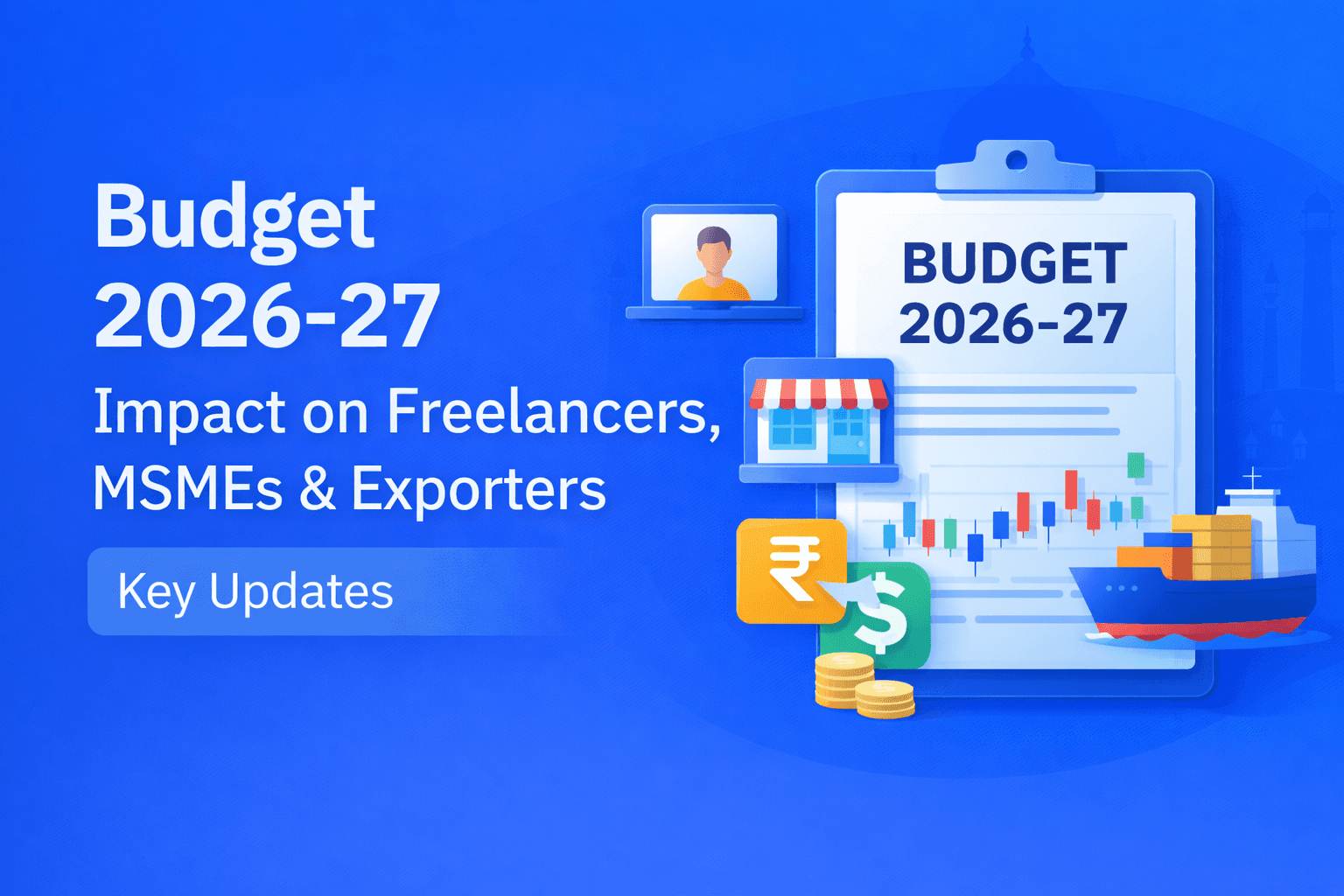Discover infinity
Posted on Oct 28, 2025
Subscribe to our newsletter
Get the latest updates, insights, and tips delivered straight to your inbox.
For every Indian exporter, smooth cross-border transactions rely not just on getting paid but also on proper documentation and compliance with regulatory norms. Two of the most essential documents in this process are the Foreign Inward Remittance Advice (FIRA) and the Electronic Bank Realisation Certificate (e-BRC).
These documents act as proof of payment receipt and are vital for fulfilling export obligations under Indian law. Understanding how they work and how they differ can help exporters avoid compliance issues and ensure timely benefits like export incentives and GST refunds.
What is FIRC and e-FIRC?
FIRC (Foreign Inward Remittance Certificate) is the document your bank issues when you receive foreign currency from an overseas client. It's your official proof that money actually arrived in India for your export transaction. Banks issue it as part of India's foreign exchange rules to keep everything transparent and traceable.
e-FIRC is the modern version. Banks and the Reserve Bank of India (RBI) worked together to turn the old paper-based FIRC into a digital system. This electronic version cuts through the paperwork, gives you better tracking, and makes communication between you, your bank, and regulators much smoother.
Information contained in an e-FIRC:
The exact date and amount of money you received
Who sent the payment (your client's name and address)
Who received it (your name and address)
Why they paid you (export of goods, services, consulting work, etc.)
How much the foreign currency was worth in rupees and the conversion rate used
Key features of e-FIRC:
It's your first official proof that you got paid from abroad
Creates a clear record that regulators can audit and verify
Eliminates mountains of paperwork through digitization
Makes it easy to track your payments and stay in touch with your bank and authorities
Speeds up how fast your export transactions get processed
In essence, the e-FIRC is your bank's first official nod that your overseas payment has arrived. It creates a complete digital record of your foreign inward remittance, so you always have proof when you need it.
What is BRC and e-BRC?
The Bank Realization Certificate (BRC) is issued by an exporter's bank after verifying that payment for exported goods or services has been completely received and realized. This certificate serves as official validation that the export transaction is finalized and that funds have been successfully credited to the exporter's account in India, in compliance with Reserve Bank of India regulations.
To modernize export documentation, the Directorate General of Foreign Trade (DGFT) launched the e-BRC system, which digitizes the BRC process. Once a bank uploads an e-BRC to the DGFT portal, exporters can immediately access and claim export benefits instead of waiting weeks with paperwork.
Key benefits of e-BRC for exporters:
Get export incentives and duty drawbacks instantly
Apply for government support schemes through one portal
Say goodbye to endless paperwork and processing delays
Track your payment verification in real time
Information contained in an e-BRC:
Your details and identification
Shipping bill number for your shipment
Invoice information from your transaction
Payment amount and the exact date it was credited
Currency conversion details for your payment
In practical terms, the FIRC and BRC serve complementary purposes. The FIRC acknowledges the initial receipt of foreign currency, while the BRC confirms that the export obligation has been fully satisfied and the payment has been successfully realized in India.
Key Differences Between FIRC and e-BRC
Quick Comparison:
What it proves | Foreign currency arrived | Export payment was realized |
Issued by | Your bank (when payment comes in) | Your bank (after verification) |
When you get it | Immediately when funds arrive | After full payment is verified |
Who makes the rules | Reserve Bank of India (RBI) | Directorate General of Foreign Trade (DGFT) |
What it does | Documents receipt of money | Unlocks government incentives |
Your payment journey has two checkpoints. The FIRC is checkpoint one: your bank confirms money actually arrived from abroad. The e-BRC is checkpoint two: your bank confirms you've completed the export and can now claim incentives and benefits. Two different banks issue them. Two different government bodies oversee them. But together, they tell your complete export story.
Verify that FIRC amounts match your invoice and shipping documents exactly. Make sure your bank uploads the e-BRC to DGFT without delay. Link each FIRC and e-BRC together so nothing gets lost. Only claim incentives after your e-BRC is officially generated. Keep digital copies of everything organized and backed up.
Switch to digital banking platforms that generate FIRCs automatically. Check the DGFT portal regularly so you know your e-BRC status in real time. Build a simple tracking system for each shipment you send. Store all document copies securely in the cloud. Keep up with RBI and DGFT updates so new rules don't catch you off guard.
Why FIRC and BRC Matter in International Payments
The FIRC: Your Payment Proof
Imagine this: Your overseas client sends you money. It lands in your bank account. But how do you prove it's real? How do you show tax authorities, banks, or investors that this money is legitimate?
That's where the FIRC comes in. It's your bank's official verification that foreign money arrived through proper banking channels, complying with Indian regulations. When tax season hits or auditors call, you have concrete proof of your export income. When you apply for a business loan, lenders see verified evidence of your legitimacy. The FIRC transforms that abstract international payment into documented proof of real, legitimate business activity.
The e-BRC: Your Gateway to Incentives
Here's how export incentives work: The government wants to reward you for bringing foreign currency into India, but they need verification first. They need confirmation you actually received payment.
That's the e-BRC's job. It validates your foreign payment was received and properly documented, official proof that your export is legitimate and you've met all requirements.
Without it? Those incentives you've earned, MEIS, RoDTEP, all of them, stay locked away. With it? They're yours to claim.
The e-BRC isn't just another form to file. It's your key to the financial rewards your hard work has generated.
How Infinity Simplifies Global Banking for Exporters?
At Infinity, we make receiving international payments faster, cheaper, and compliant. Here's what you get when you sign up with Infinity:
Key Benefits
Lowest Transaction Fee
Infinity charges just 0.5% (inclusive of all charges) as a transaction fee—one of the most competitive rates in the market.
Fastest Settlement
Your payments settle within 24 hours. Traditional methods typically take 2-5 working days to process international transfers.
Automatic FIRC
Infinity generates your FIRA (Foreign Inward Remittance Advice) instantly and free of charge after every successful transaction. This keeps you compliant with RBI's FEMA regulations effortlessly.
Multi-Currency Account
Get access to a multi-currency account that lets you receive payments in 50+ currencies from clients worldwide.
Conclusion
FIRC and e-BRC are the two pillars of export compliance. The FIRC proves your money arrived. The e-BRC proves you earned it. Together, they create an unbreakable audit trail that keeps you compliant and eligible for every incentive you deserve.
Get them right, and your export business runs smoothly. Get them wrong, and you risk missed benefits and regulatory friction.
Managing both manually is tedious and error-prone. That's where Infinity comes in. We automate FIRC and e-BRC generation, linking every transaction automatically. No paperwork. No delays. No compliance guesswork.
Stop wrestling with banking complexity. Let Infinity handle it so you can focus on growing your exports.
FAQs about FIRA vs e-BRC
1. What is the main purpose of an FIRC?
An FIRC confirms that foreign currency has been received in India through authorized banking channels.
2. How is an e-FIRC different from a physical FIRC?
An e-FIRC is a digital version generated by banks, which simplifies recordkeeping and verification.
3. Who issues the e-BRC?
The exporter’s bank issues and uploads the e-BRC on the DGFT portal after confirming full payment realization.
4. Can an exporter claim benefits without an e-BRC?
No. e-BRC is mandatory for claiming export incentives or government rebates.
5. How does Infinity help with FIRCs and e-BRCs?
Infinity streamlines cross-border payment tracking, ensuring exporters receive timely FIRAs and stay compliant with documentation and DGFT requirements.





